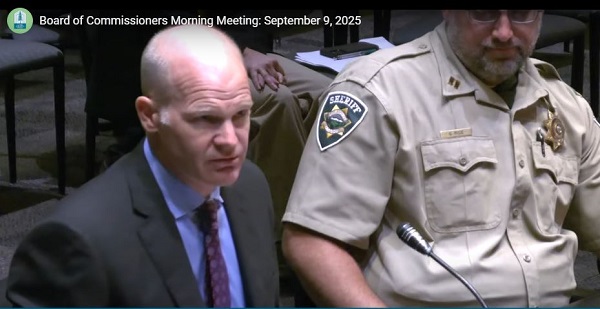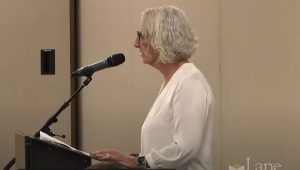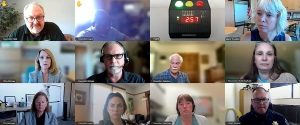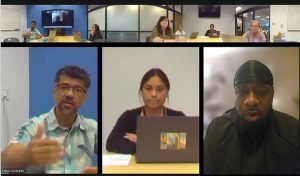Judge: Loss of public safety funding will mean more property crime, violent crime
9 min read
Presenter: With less state money than expected, Lane County is looking at losing 34% of its Parole and Probation staff. A Circuit Court judge says if that happens, we’ll be seeing more property crimes and more violent crimes against local residents. On Sept. 9, Lane County’s director of Community Justice and Rehabilitation Services, Greg Rikhoff:
[00:00:22] Greg Rikhoff (Community Justice and Rehabilitation Services, director): Of course, public safety is one of the county’s highest priorities, and we are stuck here with a significant funding gap. Did want to let you know that should the state have funded the time study, that would have come in at about $340 million.
The governor’s recommended budget was $332.5 million. It’s a significant step forward. It’s one of the first times we’ve seen an Oregon governor really come in with a significant contribution, and that was the dollar figure we were expecting to use up until the May financial forecast, at which time the state legislature decided to go with the bare minimum. That puts us at $279 million statewide. So that drop from $332 million to $279 million is what is causing the gap that we’re looking at here today.
[00:01:22] Just very quickly as I wrap up my comments, I’ve invited Circuit Court Judge Brad Cascagnette to the table. He too is a member of the Public Safety Coordinating Council Budget Committee and has some observations in terms of what this means for the courts.
[00:01:40] Brad Cascagnette (Oregon 2nd Judicial District Circuit Court, judge): I’m Judge Cascagnette. I’ve been a Circuit Court judge since 2018. Prior to that I was a criminal defense attorney for 16 years, so I’ve been dealing in the criminal justice system basically my entire career. I was tasked I’m currently the chief criminal judge for Lane County Circuit Court assigned by Judge McAlpin and part of that assignment comes participation in this budget committee.
[00:02:03] I am new to this table. Prior to me, it was Judge (Debra K.) Vogt who went through this process previously. Thankfully, she was there to help me throughout this process.
[00:02:14] It’s not lost on me that this budget stuff is tough. You know, people come ask you for specific pots of money, but you have to look at the entire pool. And so it’s not unlike decisions that we have to make every day, trying to figure out everything and what’s best globally, not for any specific issue. I mean each of the specific issues, but balanced how it is for everything else.
[00:02:38] And so the state obviously went through this process and they made a decision and that decision forces, I think, you to have to make a decision of whether or not this is going to be supplemented in any capacity.
[00:02:54] And I’m not here to tell you ‘you should’ or ‘you should not do that’ because I don’t think that’s my specific role. But I have participated in this budget process and listened to some of the impacts this is going to have on the community and first I just want to thank everyone at this table for the jobs that they do and the people they supervise and the offenders that they assist. Right?
[00:03:18] Our goal is to get these offenders out of the court system, out of the criminal justice system. Right? That’s the ultimate goal. It’s not always successful, but it has the opportunity to be more successful if we’re going to properly fund these things.
We rely on the jail for pre-trial detention, accountability through service of sentences either in the jail or alternative road crew type of sentence.
[00:03:47] We rely on Parole and Probation for reformation and accountability and notification to the court when offenders aren’t specifically following sentences that we order them to serve. We rely on sponsors because everyone needs housing. People who go to prison reenter society, if they don’t have a place to go. Obviously, that presents difficulties for them in removing themselves from the criminal justice system.
[00:04:18] In terms of the Court, I think that there are four very real impacts that this if if this particular budget goes through and is not supplemented in any capacity, I think there are four very real impacts for the Court.
[00:04:32] One, I think prosecutors are not going to negotiate many cases to a probationary sentence because they’re not going to know if these offenders are going to be really supervised and they’re not going to know whether or not the offenders are doing what they’re supposed to do and other citizens of Lane County are kept safe because of that lack of oversight.
[00:04:56] Conversely, I think some defendants are not going to negotiate cases because they’re not going to know if they’re going to be eligible for alternatives on the road crew. And so if they don’t know if they’re going to go to jail and serve a 30-day hard sentence, or if they’re going to be able to keep their job and work road crew or do other some sort of sanction through the jail, they’re in a tough spot in terms of whether or not they should negotiate. They don’t know how that’s going to impact their specific family or individual life.
[00:05:28] As a result of these two things, I think the court workload is going to increase. I think we’ll probably have more trials and more sentences that the court is determining our appropriate in each individual circumstance. As a result of all of this, ironically, although the state gives the county money to supervise people in the community, and part of this is the justice reinvestment components where we’re supposed to decrease prison population, right? That’s the heart of the justice reinvestment and what they want us to do.
[00:06:05] Ironically, I believe, and my colleagues at the Court believe, that this is likely to result in more prison beds, more prison sentences, which at the end of the day may in fact be a larger cost to the state. Those are what I believe the impacts of the court are, at least three of them.
[00:06:30] I told you there are four. But those three impacts really are not your issue, right? If the Court works more, that’s not your problem. If people go to prison more, that’s partly your problem, but not in terms of the budget problem because the state’s paying for that, right? Not you.
[00:06:49] But the problem comes with the impact on the local system in terms of recidivism and community safety. This is where you have to figure out, in the grand scheme of the entire budget, what to do with this shortfall.
[00:07:11] Without additional funding, the Court believes that the goal of removing as many people as we can from the criminal justice system is not likely to be achieved. We’re likely to have more property crimes. We’re likely to have other offenses that are going to be committed as a result of this, and unfortunately some of them are likely to be violent offenses to citizens in our community.
[00:07:40] If Parole and Probation lays off 34% of their staff, the numbers that you heard, and I’ve sat through this budget meeting for months now, right? And this is not new to me. But when that screen went up there and that, the number of probation officers that are going to be cut and the number of people who are going to be unsupervised kind of made hairs on the back of my neck stand up.
[00:08:02] It’s a serious concern to the court from a community safety perspective.
[00:08:08] So these offenders who are sentenced and again the goal is to reform them, but part of that reformation is going to anger management, going to domestic violence treatment, doing other types of things to better themselves. Parole and Probation is the safeguard for that.
[00:08:25] They know if people are participating in these programs. They know to notify the court and the district attorney’s office when people aren’t successfully completing these programs. That oversight is going to be removed from the equation, and it’s going to have a domino effect on what happens to these offenders who are on probation in terms of: what’s not going to happen to them, right?
[00:08:48] They’re going to maybe be in the community not doing what the court ordered them to do, not receiving sanctions for not doing those things, and therefore having no incentive to follow through with the sentence of the court to better themselves, to remove themselves from the criminal justice system.
[00:09:06] We order that they’re not to have contact with victims. Parole and Probation is the safeguard for this. Without that safeguard and someone monitoring this, are we going to catch wind of that? We are, but probably maybe when it’s too late.
[00:09:24] Are they committing new crimes: Parole and Probation is the person who often files those reports, brings things back to the court and the district attorney’s office. Are we going to find out if they’re committing new crimes? Yes, we are. But unfortunately, it’s going to be after property crimes or person crimes have been committed.
[00:09:44] If Sponsors is cut, and offenders who are entering coming back from prison or even are getting housing on parole and probation. We all know if you don’t have housing, it’s a huge, huge struggle. That’s number one, right? And part of that housing that they provide is the cognitive therapy and other things to help people better themselves to remove them from the criminal justice system. If you don’t have housing, your chance of succeeding is not good.
[00:10:17] Prior to taking my job as a judge, I remember one specific client who had circulated through the criminal justice system in a fairly short order, and I remember him because this is his specific quote to me: ‘I was paroled to a bush.’ He had no family, he had no housing that he perceived that he could go to, and he ended up right back in the criminal justice system right back in the jail and costing the county and the state more money almost instantly where if he had some place to go.
[00:10:49] And I’m not saying this individual did or did not, I don’t know what the circumstance was at that point in time but it’s a truth that if there are this many people who are going to be released from the prison system that sponsors cannot help, they’re going to come back before the court.
[00:11:08] At sentencing, when I send people to prison, nobody likes to send people to prison, but when we send people to prison, we tell them, we try and encourage them, ‘Hey, there are alternative incarcerative programs you can get in the prison system. You can better yourself.
[00:11:24] ‘Also, you need a plan. You need to start thinking of your plan right now for when you re -enter into society. Think about calling Sponsors. Think about where your housing is going to be.’ This is a conversation I have with them at the time of sentencing to get them thinking about this.
[00:11:42] So if I’m getting them to think about it and now they’re thinking about it and they’re calling the county or Sponsors and learning, “Oh, well, that doesn’t include me because there’s not enough housing there for me, you can imagine what that might have on their psyche as they reenter into society.
[00:12:01] And so from the Court’s perspective, everything that’s been established over the course of these years to make people accountable, to reform them, and to remove them from the criminal justice system is at serious risk with this budget that the state has left all of you to grapple with.
[00:12:22] If this budget is imposed,… many of these offenders are going to commit new crimes against citizens of the county of Lane and we’re going to go through it all again and figure out what to do from that step forward.
[00:12:37] And so I just want to thank all of you for grappling with this difficult decision and I want to thank all of them for doing the job that they do because the court couldn’t function without this process. I mean we will, we’ll function but it’s toothless and offenders aren’t going to be reformed.
[00:12:55] And so it’s a difficult position that everyone, not just our county, but every county is in throughout the state. And so I appreciate your thoughts and your consideration of all of this as you figure out what to do for these agencies. Thank you.
[00:13:11] Presenter: Judge Brad Cascagnette predicts the outcome as Lane County considers the loss of 34% of its Parole and Probation staff.






